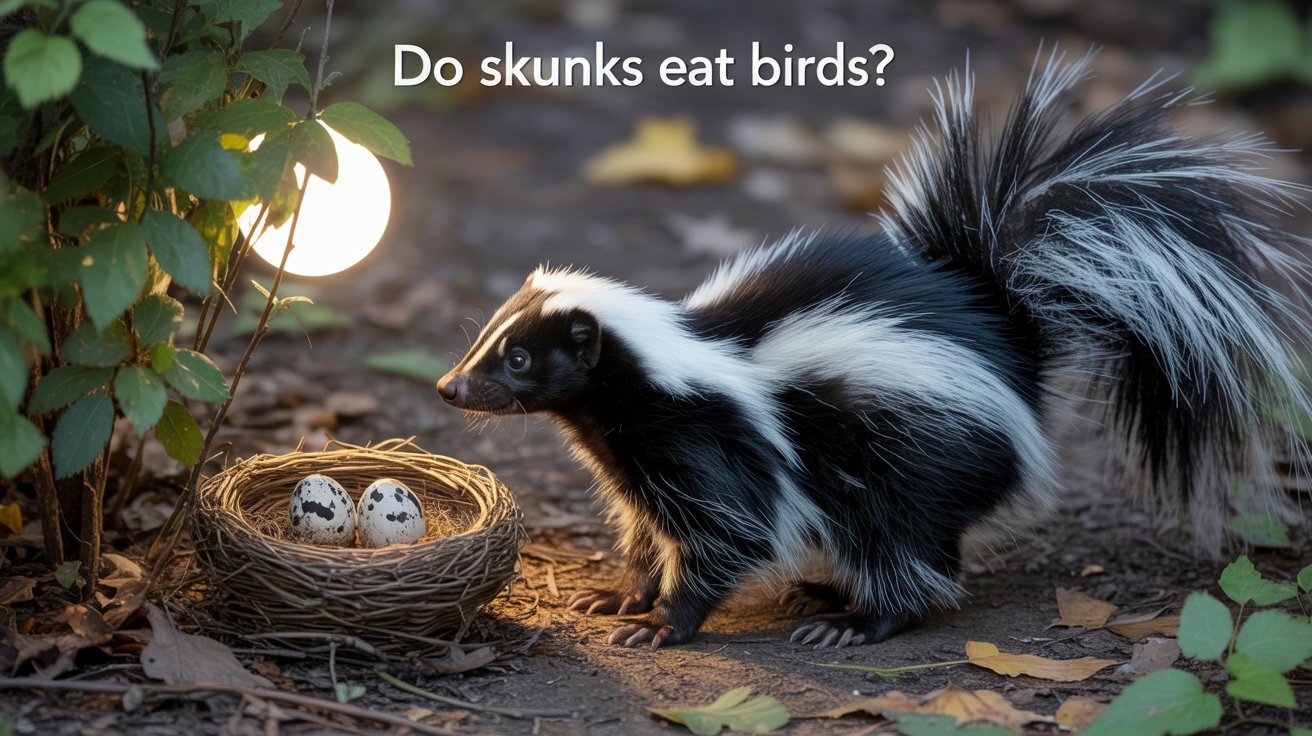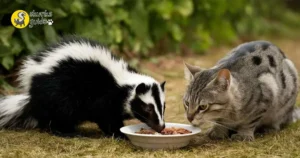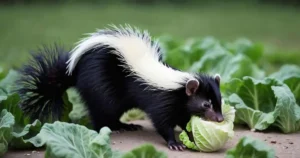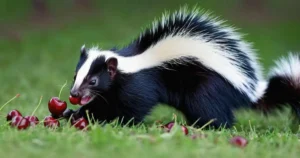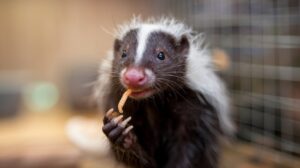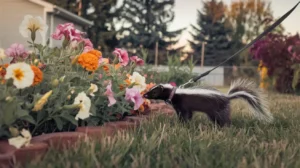Do Skunks eat Birds? Uncover the Truth
As a skunk owner and wildlife enthusiast, I’ve delved deeply into the behaviors and dietary habits of these fascinating creatures. Skunks are known for their opportunistic feeding habits, eating a wide variety of food. But what about birds? Do skunks eat birds? The answer is yes, but it’s not their primary food source. Skunks are more likely to eat bird eggs and nestlings, and in rare cases, they may prey on small or injured birds. Their foraging behavior and ecological role make them occasional predators of birds, but they’re far from the main threat to avian populations.
In this article, we’ll explore how skunks interact with birds, what drives them to eat them, and how to protect birds from skunk predation.
Do Skunks Prey on Birds?
Skunks are opportunistic feeders, meaning they’ll eat almost anything they can catch or scavenge. When it comes to birds, their predation is often situational.
Bird Eggs and Nestlings
The most common interaction between skunks and birds involves eggs and baby birds. Skunks use their sharp claws and keen sense of smell to locate nests, particularly those of ground-nesting birds. Once they find a nest, skunks will eat the eggs or nestlings.
Adult Birds
Skunks rarely hunt adult birds because:
- Birds are typically too fast or agile for skunks to catch.
- Skunks are not built for chasing or flying prey.
However, injured, sick, or grounded birds may fall victim to skunks. In urban areas, skunks might scavenge on deceased birds if they come across them.
Why Do Skunks Eat Birds?
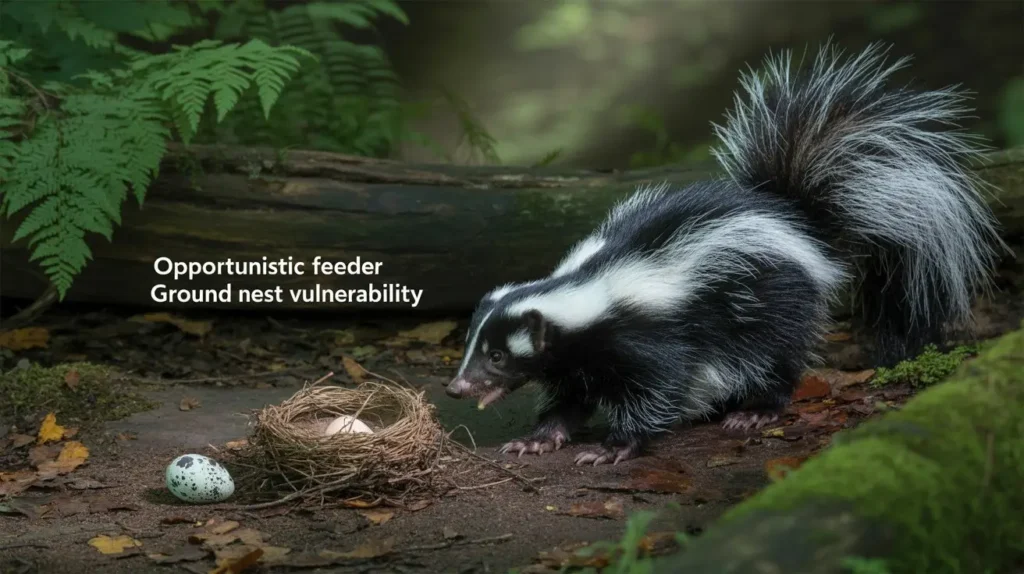
Skunks may eat birds or their eggs for several reasons:
Ease of Access: Ground-nesting birds are more vulnerable to skunk predation since their nests are within easy reach.
Nutritional Value: Eggs and nestlings are rich in protein and energy, essential for survival, especially during lean seasons.
Food Scarcity: When their usual food sources are unavailable, skunks turn to alternative options like bird nests.
How Do Skunks Hunt Birds?
Skunks are not skilled hunters but rely on their senses and scavenging abilities. Here’s how they target birds:
Locating Nests
- Skunks use their powerful noses to sniff out nests, even those hidden in dense vegetation or under debris.
- They primarily forage at night, taking advantage of sleeping birds and reduced activity.
Raiding Nests
- Once they locate a nest, skunks use their claws to dig or dismantle the nest.
- They consume the eggs or young birds directly in the nest.
Scavenging Dead Birds
- Skunks are natural scavengers and may eat dead birds they encounter, especially in urban or suburban areas.
Impact on Bird Populations
While skunks do prey on birds, their impact on bird populations is usually localized and minor. Other predators, such as foxes, raccoons, and snakes, pose a greater threat to birds. However, in areas with high skunk populations, ground-nesting birds may face increased risks.
Species Most at Risk
Urban Birds: Birds nesting in low or unprotected areas may also be at risk.
Ground-Nesting Birds: Ducks, quails, and plovers are particularly vulnerable.
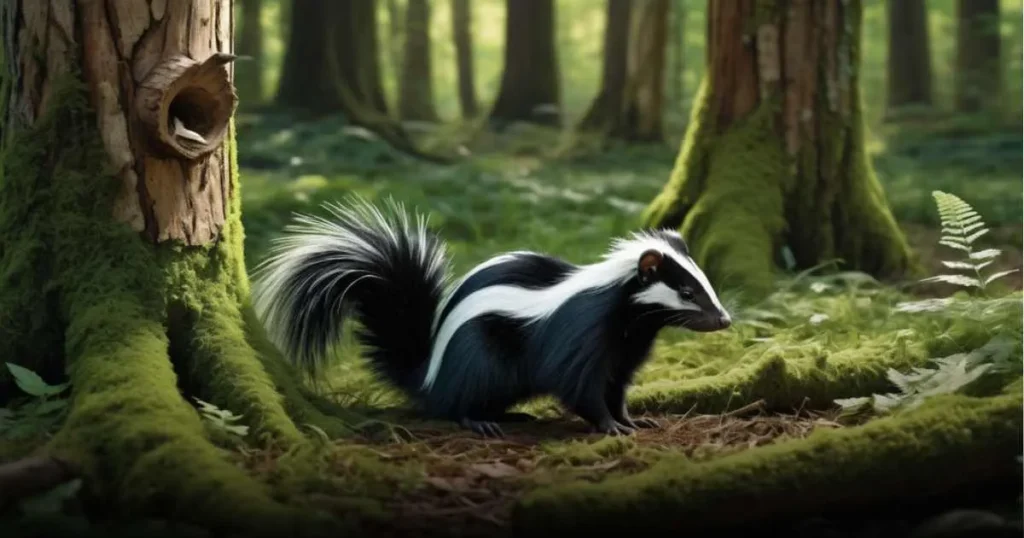
Protecting Birds from Skunks
If you want to protect birds in your yard or conservation area, there are several steps you can take to minimize skunk predation.
For Ground-Nesting Birds
- Install Nest Barriers: Use wire mesh or hardware cloth to cover nesting areas.
- Elevate Nesting Sites: Encourage birds to nest in trees or elevated platforms.
- Remove Attractants: Keep the area clean of food scraps or fallen fruit that might attract skunks.
General Deterrents
- Secure Trash Cans: Skunks are drawn to garbage, so ensure bins are tightly sealed.
- Motion-Activated Lights: Bright lights can deter nocturnal skunks.
- Natural Repellents: Sprinkle cayenne pepper or citrus peels near nests to discourage skunks.
Skunks’ Role in the Ecosystem
While skunks occasionally prey on birds, they also contribute positively to ecosystems by controlling insect and rodent populations. Their omnivorous diet helps balance various species, making them an integral part of their habitats.
Ecological Benefits
- Reduce pest populations, protecting crops and gardens.
- Disperse seeds through their droppings, promoting plant growth.
- Scavenge carrion, aiding in natural waste management.
Frequently Asked Questions
Do Skunks Eat Bird Eggs?
Yes, skunks frequently eat bird eggs, especially from ground-nesting species. Eggs are a rich source of nutrients and easy for skunks to access.
Can Skunks Catch Live Birds?
While skunks are not adept at catching adult birds, they may prey on injured or grounded birds. They’re more likely to consume nestlings or scavenge dead birds.
How Do I Protect Bird Nests from Skunks?
To protect bird nests, elevate nesting sites, use wire mesh barriers, and keep skunks away with motion-activated lights or natural repellents.
Conclusion
So, do skunks eat birds? While it’s not common, they may eat bird eggs, nestlings, or occasionally scavenge on dead birds. Their opportunistic feeding habits make them adaptable predators, but their impact on bird populations is generally limited. Understanding skunks’ dietary habits helps us appreciate their role in ecosystems while taking steps to protect vulnerable bird species when necessary. With proper precautions, we can ensure that both skunks and birds thrive in harmony.

